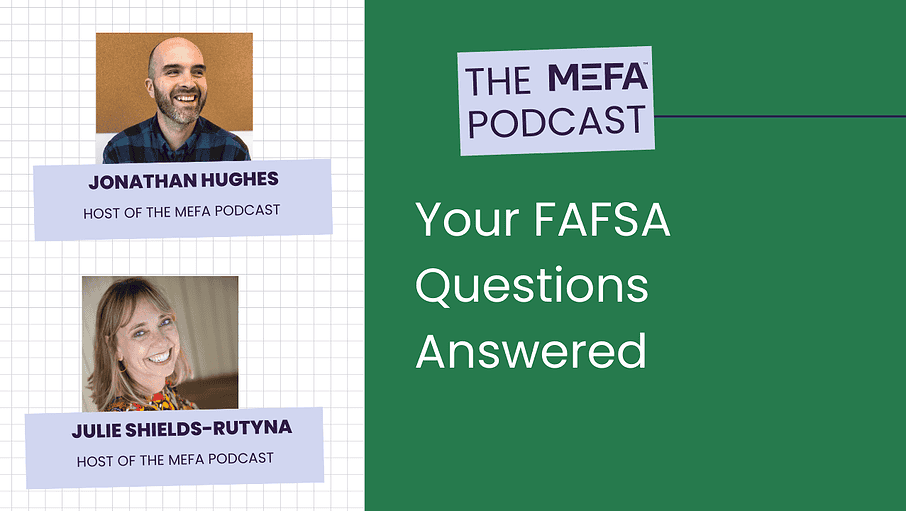

Resources Mentioned in this Episode
Jonathan Hughes: [00:00:00] Hello everyone and welcome to the MEFA Podcast. My name is Jonathan Hughes.
Julie Shields-Rutyna: And I’m Julie Shields-Rutyna.
Jonathan Hughes: Hey Julie, how’s it going?
Julie Shields-Rutyna: Hi Jon, it’s going great.
Jonathan Hughes: Last show of the year.
Julie Shields-Rutyna: I know. We’re winding down.
Jonathan Hughes: Another year of the MEFA Podcast down. I think it was a good one.
Julie Shields-Rutyna: It definitely was.
Jonathan Hughes: We’ve got a whole bunch of exciting things planned for next year, but there’s exciting things going on right now. The FAFSA’s coming out at the end of this year. So next week or is it next week? A week from Monday, December 31st. Is it? Yeah, December 31st, New Year’s Eve, the FAFSA is available. And so we know people have a lot of questions about the FAFSA. We did a webinar on the 4th of December, understanding the FAFSA and Julie, about how many people registered for that.
Julie Shields-Rutyna: I think we had upwards of 800 people register for that, which might be the largest webinar registration we’ve had to date.
Jonathan Hughes: I think it was huge. So, we thought what [00:01:00] we’d do is take some questions from that webinar that we know a lot of people had and answer them for our podcast audience right now. And before I go into that, I just want to let everybody know, if you have any questions, you can email us at [email protected], or you can call us at 800-449-MEFA, and you can reach us over social media on Facebook at @MEFAMa, on X at @MEFATweets and on Instagram at @MEFA_MA, we have a bench of college guidance experts that are here to answer those questions for you. So, we want to be here for you all the time. Shall we get into it? All right. So, the first one I’m going to ask about, and we have a lot of questions about FSA IDs. I’ll ask this question and then maybe we can just talk about briefly what FSA IDs Yeah. And how this relates to the answer. So, does [00:02:00] it matter who’s FSA ID you put in when you start the form?
Julie Shields-Rutyna: Okay. So, I guess that’s a question about who’s going to start the form. But what I will say is an FSA ID. It’s simply your username and password, and that allows you to access the federal system. So, you definitely need that to complete the FAFSA and everyone whose information is going to be on the FAFSA needs to have an FSA ID. There’s a little exception, of course, that we’ll talk about, but that’s the bottom line. So, we’ve been advising that people go now and create their FSA ID, so they have them.
And then when the FAFSA is available, you can go in and start the FAFSA and use your FSA ID. It seems to work best. The guidance we’re giving is it seems to work best if the student goes in first with their FSA ID, starts the form, [00:03:00] and then invites the other contributors. Contributors being the people who are going to put their information on the form contributing. Their information and then invites those people, like a parent to then access the same form. So that’s the way we’re guiding people. It is also possible that a parent could go in first, start the form but it seems to work easier in the way that it’s structured for the student to go in and invite the other people.
Jonathan Hughes: And do we know why that is?
Julie Shields-Rutyna: It is- the funny thing is, as parents and I know Jon, you and I are both parents, we tend to do a lot for our kids, but the bottom line is, this is the student’s form. The student is applying for college and applying for financial aid. The format and the structure of this makes that clear that it’s the student applying for financial aid.
Jonathan Hughes: Yeah. So actually I wonder if we could back up just a minute and talk about the FSA ID. She said everybody who needs one, [00:04:00] everybody who is going to be on the FAFSA, their information’s on the FAFSA, generally speaking with one exception. They each person needs an FSA ID. So students always need an FSA ID, right?
Julie Shields-Rutyna: Yes. And then parents need an FSA ID. The one exception and it’s a big one is that if parents are married and filed a joint tax return then only one parent needs an FSA ID in that instance. And so that’s a lot of people. But if parents are not married or filed a or are married and filed separate tax returns in that case, each separate parent needs an FSA ID as well.
Jonathan Hughes: Okay. And so just to let people know too, it takes about how long to get an FSA ID.
Julie Shields-Rutyna: Right now they’re saying if you go in and create an FSA ID, you should count on three to five days for that being approved and verified and ready to go.
Jonathan Hughes: Next question. I’m divorced from the student’s other parent and I’m the primary support. I [00:05:00] remarried this year, so there’s a step parent. We have never yet filed taxes together. Does he also need an FSA ID?
Julie Shields-Rutyna: So yes, and let me step back a little because this is important. So if parents are divorced or separated Then it is the parent who provided the most support? In the past year that is the parent who completes the FAFSA and the other parent does not need to complete the FAFSA.
So in this case, it is this parent who’s asking the question, but because this parent who’s asking the question is remarried, it is this parent and spouse whose information needs to be on this form. And because they haven’t filed a joint tax return, even though they’re married, then both of these people will need an FSA ID.
So the parent who provided the most support and spouse will each need their own FSA ID because their financial information will be contributed on [00:06:00] the form.
Jonathan Hughes: That’s a really good question. I didn’t even think about that population of folks who just got married and never filed a tax return together that they would both need an FSA ID. So I’m glad. And that actually takes care of the next question that we had, which is, but maybe we can reiterate it. For the parent who’s provided the most support in the last 12 months, is that 2022 when the FAFSA, because the FAFSA looks at the prior year, right? So for folks who are filing this year for next year, they’re going to look at the 2022 income. Or is it the 12 months that are, that have just passed before filing the FAFSA? So 2023, for example.
Julie Shields-Rutyna: Yeah. So I believe the way it’s worded is The last 12 months, but again, as you say, the actual tax return information that is going to be used to calculate the whole financial aid number and all of that is going to be the [00:07:00] 2022 tax return for any students who are applying to college for the 24-25 starting in the 24-25 academic year.
Jonathan Hughes: Okay, now this is the question that I think is a great question. And I think that this is where I have questions, because I know people haven’t done this yet. As we said, the student should start, and then invite the following contributors to complete their portion of the FAFSA. So does the student send an invitation, after they do that, let’s say the student logs in, they complete their portion of the FAFSA, do they then invite both parents? Or do they invite one parent, or how does that go?
Julie Shields-Rutyna: Yeah, they would invite anyone else who has an FSA ID. So for example, in the conversation we just had about the parent who provided the most support and spouse, they would invite both of those people because they each have an FSA ID. If someone else has parents who are married and filed a [00:08:00] joint tax return, at this point, they can just invite the one parent who is going to, who has the FSA ID and therefore can access the FAFSA and will go in and complete the FAFSA. Later in the process, that other parent does put the name of the spouse but as far as inviting, they only need to invite the person who has the FSA ID to get into the form.
Jonathan Hughes: And what if there’s an example where, just like the one we just talked about, where there are two parents who filed separately and both have FSA IDs?
Julie Shields-Rutyna: Then the student would need to invite both of those parents.
Jonathan Hughes: Oh, okay. This is a kind of niche question, but, I thought because it was a niche question, I thought it would be interesting for to answer. So I hope you have an answer for it. If your child has applied for an ROTC scholarship, does that affect the FAFSA? And is there a place where you can put that into the FAFSA to note it?
Julie Shields-Rutyna: Yeah, that’s such a good question. Because it’s [00:09:00] the student has just applied for that scholarship that wouldn’t be put on the FAFSA up front. So no, there isn’t a place to put that into the FAFSA up front. However when a student receives a financial aid offer from a college there’s usually some fine language that says in accepting this award offer you need to let us know of any other outside scholarships that you receive. So the student, when they accept an award offer from a college, they’re saying that I’ll let you know if I receive any other awards. And if they do receive that ROTC scholarship, then they would need to let the financial aid office know.
Jonathan Hughes: This is a, we’re moving into an area now that I think we’re going to get a lot of questions on or at least one that I will have a lot of questions because I don’t know the answer here. This is a question about child support. I received child support for both children per week. Do I split that figure out since only one child is going to college?[00:10:00]
Julie Shields-Rutyna: Yes.
Jonathan Hughes: Somebody also had a question about child support. That child support received is now listed as an asset. Is that correct? But what about child support paid?
Julie Shields-Rutyna: Is not a question on the FAFSA.
Jonathan Hughes: Ah, okay.
Julie Shields-Rutyna: It’s only one, in a case like that, where there’s child support coming and going, if it’s the parent who’s paying the child support, they want to get that full income anyway. They’re just taking the income of that parent. Whereas if it’s the other parent, the parent who is receiving the child support, they want that too because they want to know what’s going for the kid. They’re only taking one parent’s income. In a divorced or separated situation.
Jonathan Hughes: Okay. Now moving into 529 questions. With twins, what do you put for the value of a 529? Would you split the amount, and what if the 529 account owner is the non-custodial parent? I guess in this case they mean the [00:11:00] parent not filing the FAFSA. So that’s two questions there.
Julie Shields-Rutyna: Two questions. This, wow, this goes to a number of things though, John. So parent only needs to report the 529 account that has the beneficiary listed as the student. Who is going to college, right? Oh, I guess in that case with twins that yes, they would list one child’s 529 on one account on one FAFSA and the other child’s account on the other FAFSA. That’s where it’s useful and helpful to have separate 529 accounts for all of your different children. So that’s what I’d say there. And then the second question, if. It is not the person filing the FAFSA who owns the 529 account, then it doesn’t get reported. This is, it doesn’t show up anywhere.
Jonathan Hughes: So let’s finish by talking about one of the big changes in the [00:12:00] FAFSA this year, and that is that the FAFSA, even though it still asks about the number of students that will be in college in the upcoming year, so if you have more than one student in college at the same time, that information won’t impact Your aid eligibility at all, right? They’re not taking the number of students in college at once into account anymore for how much you should be able to afford for college. We’re hearing as we knew we would. People who are really worried about that. I just got this question last night. What do we need to do about that? Should I let the schools know that I have more than 1? Child in college.
Julie Shields-Rutyna: Yeah, the FAFSA does ask how many students do you have in college? So the schools will know that colleges that have their own financial aid grants and scholarships will also have that information and that’s part of a [00:13:00] larger picture of a family’s financial situation. If they have numerous students in college at one time, and can take that into consideration. So it is a factor, but it is not going to be a blanket: you get a break if you have two kids in college at once anymore. The last thing I will say is that current college students who entered college with that break colleges do everything they can to try to ensure a similar financial aid offer from year to year.
So I think colleges are figuring out how they will be able to grandfather some students who might be in that situation. But starting going forward that break will be gone from the FAFSA.
Jonathan Hughes: Yeah, and I think, the only other thing I would add to that is that this is all part of a redesign for the entire FAFSA, right? And so some of the impact of that for families who do have more than one child in college at once will [00:14:00] be blunted, hopefully, by the fact that the income protections have been increased for this year’s FAFSA formula as well.
Julie Shields-Rutyna: And John, I’m going to say something else just because we do a lot of work encouraging families to save. And I guess I think that. It really just strengthens that, that argument that we have with not argument, but the advice that we give to people to save as much as you can for college for if you have two students, you need to save a little bit more than if you have one, if you have three, you have to save a little bit more because in the past, sometimes that got a little bit confusing where people maybe in their minds thought that they were going to get a break and they didn’t have to save as much. And for a lot of families that I spoke with, the break was never as much as they anticipated anyway. So I think that for families with kids of different ages just more incentive to, save as you can.
Jonathan Hughes: I think that’s true. [00:15:00] And before we go. The FAFSA becomes available December 31st, as we said people have been waiting to file it. What would you advise families who rushed to complete the FAFSA early? Is there anything that they should keep in mind?
Julie Shields-Rutyna: Yeah, I guess what I would say is get your FSA ID now so you’re ready to go. There is no reason you need to spend New Year’s Eve completing the FAFSA. Zero. Do not do it. And in fact, while we always want to encourage you to do this form as quickly as possible, given that it’s delayed and everyone is really ready to get this in, I don’t think you need to do it on, New Year’s Day or even January 2nd, just make a plan that you will complete the form in the beginning of January. You will meet all of the deadlines. Information from the FAFSA is not going to arrive [00:16:00] at the schools until the end of January anyway. So I think technology wise and everything, find an off time somewhere. near the beginning or middle of January to complete your FAFSA. And while the delay has been a little bit of a stress, hopefully the form will be a lot simpler and you’ll get that done and you’ll meet all of the deadlines and you’ll be absolutely fine. Be on it, have it on your to do list, but do not panic and feel like you need to get this done in the first. three days of January.
Jonathan Hughes: Oh, and we should mention our help, right? Our FAFSA help events that we’re having.
Julie Shields-Rutyna: Yes. Yes. So we have our first FAFSA festival on January 24th and FAFSA festival is a draw, a virtual drop in event where you can come in. We pair you with an expert and you can get help completing your FAFSA. Some people come and. Do the [00:17:00] whole FAFSA online with the expert, or some start it in advance and save as they go along and just have a couple of questions and call in and get those questions answered. So that’s our first event and we will continue to have more as if people continue to need help completing the FAFSA.
Jonathan Hughes: We’ll put the link to that in the show notes probably so folks can register and and attend that. All right Julie, have A happy holiday or happy holidays and we’ll see you next when the FAFSA is out in 2024.
Julie Shields-Rutyna: That sounds great, Jonathan. Fingers crossed.
Jonathan Hughes: I know, I know. And so I also want to thank our producer, Shaun Connolly. I want to thank AJ Yee and Lauren Danz for their assistance in getting the show posted. Remember if you liked what you heard today and you want to know more from MEFA on how to plan, save, and pay for college and career readiness, as well as [00:18:00] reaching financial goals. You can follow the show wherever you get your podcasts, and please remember to review us.
It helps us to keep doing what we’re doing and getting the show out to folks like you. So next time we’ll see you in 2024. Until then, this has been the MEFA Podcast.













